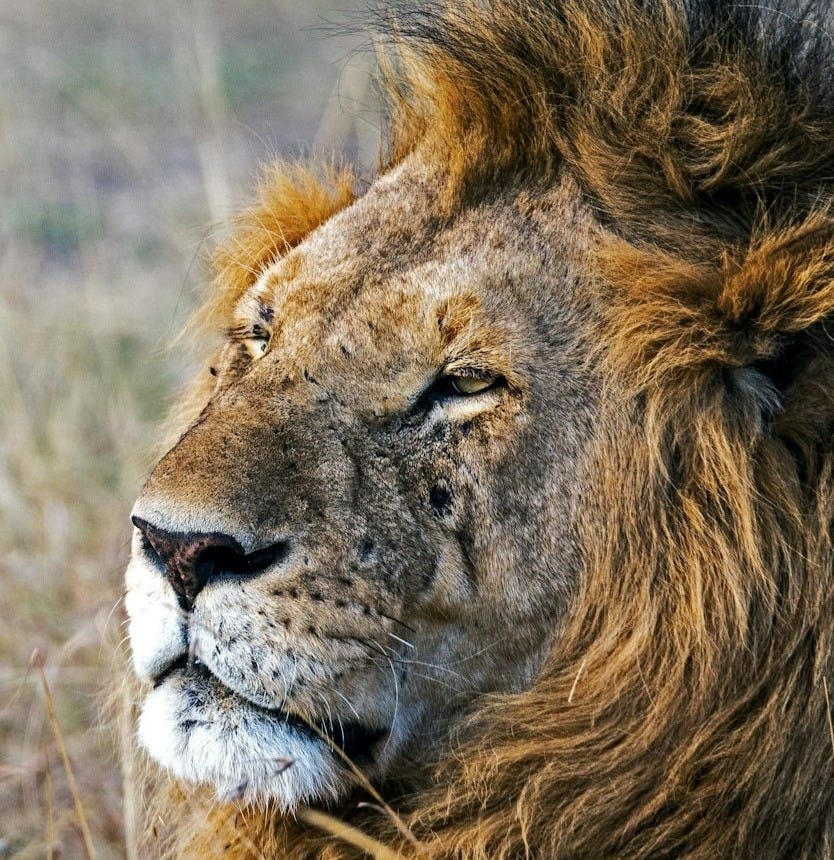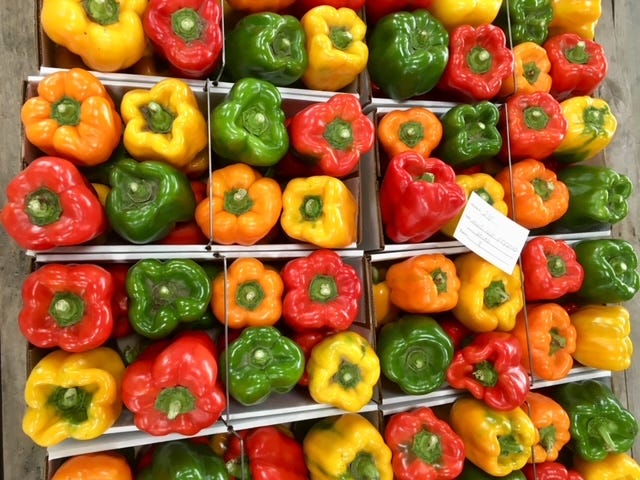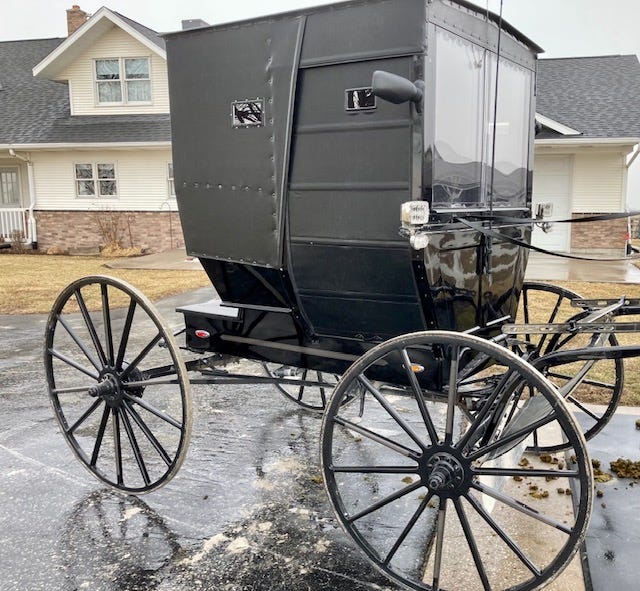
Mary Swander is off doing research, learning how to butcher a hog. Here’s a piece you’ll enjoy from her archives, originally published in Matrifocus. com. Back soon.
“Black people are coming!” Rachel Fay said, standing next to my basket of hot peppers on the table.
It was nearly five o’clock in the evening, an hour after closing time at my Amish neighbor’s produce stand. The Yutzys were busily tallying up their money and finishing the rest of their chores. I was on my bicycle picking up my unsold vegetables and herbs. An old Buick rumbled up the wide circular lane, a husband and wife in the front seat with two children in the back. The Yutzy’s dogs, Buster, Sport, and Jack barked. The man appeared to be dressed in a T-shirt and jeans but the woman wore an orange headwrap and a sarong.
Eleven-year-old Rachel Fay’s eyes opened wide. The Old Order Amish are so removed from the outside world that they rarely experience people of different races or cultures. The Amish can be fearful of outsiders and their response can be anything but politically correct.
“These people are going to be nice, Rachel Fay,” I said. “They’re going to speak different languages.”
“How do you know?” she asked.
Rachel Fay, like all Amish school-age children, was bilingual in English and Deitsch, but she had a special gift for languages. She had already picked up many Spanish phrases she’d learned from another customer at the produce stand, and had asked me to teach her to count to ten in French. In turn, she’d taught me simple sentences like “I want some goat’s milk,” or “Let’s go home,” in Deitsch.
The customers threw open all four doors of the car and the children—a boy and a girl both under five years old—spilled out and began chasing the kittens into the barn. The woman hung back near the car, but the man approached the table, the words “Hakuna Matata,” stamped on his T-Shirt. The man wanted to buy a goat. The Amish explained that they milked goats but didn’t sell the animals for slaughter.
“But we have fryers,” Bertha Yutzy offered. “And lots of vegetables.
The woman inched toward the table, picking up a large, white patty pan squash and examining it quizzically.
“Are you from Kenya?” I asked the man.
He smiled and pointed to his shirt. “Hakuna Matata. You know The Lion King? It means no worries, no big deal.”
“Hakuna Matata,” Rachel Fay repeated.
“Do you speak Swahili?” I asked.
“Swahili and six other tribal languages,” Hakuna Matata said.
“Teach Rachel Fay here how to count from one to ten in Swahili.”
The man beamed and started in. “Moja,” he said.
“Moja,” Rachel Fay said.
Hakuna Matata repeated each number until Rachel Fay had it down. “Mbili, tatu, nne, tano, sita, saba, nane, tisa, kumi.” She gave him a piece of paper and he wrote down the numbers. She read the paper over and over again, smiling, her eyes sealed shut in concentration.
The Kenyan family bought a chicken (kuku), a dozen eggs (mayai), and a bag of potatoes (mbatata). We all waved and called good-bye (kwaheri) to them as they wandered back down the lane, still in search of goat meat.
I rode home on my bicycle, my basket of peppers on the back, thinking that perhaps I had made a little difference in the world that day.
But two weeks later, I wasn’t so sure.
“It’s the Negroes again!” Rachel Fay called from the window of the house, the dogs barking. The Yutzys had closed their stand hours before. Most of their family was in the house, the daughters washing their long hair in preparation for church the next morning. The sons had already hosed down the buggies and put them away in the barn. I had been late picking up my vegetables and stood in the mudroom in my bicycle helmet with my basket of peppers. I was settling up the money with Bertha.
Up rumbled Hakuna Matata’s old Buick. This time the car was filled with relatives.
“Let me deal with this,” I told the Yutzys. “I’ll sell them a chicken and you can just stay in the house.”
I met Hakuna Matata at the produce table surrounded by his relatives. Sport and Buster sniffed his heels. Hakuna’s children scurried into the barn with the kittens.
“The last time we were here this family was so welcoming,” Hakuna Matata said. “We just had to introduce my wife’s family to them.” Hakuna motioned to his brother-in-law and his wife. By this time the Yutzy children were seeping from the house into the yard. The two families stood on either side of me, eyeing each other. The Amish shifted from one foot to another. The Kenyans hung back behind Hakuna and let him do the talking. He explained that on their previous visit they had gone for a ride in the countryside and happened upon the produce stand, so they decided to stop and talk to the peasants.
“We didn’t know who you were,” he said. “So we went home and looked on the internet and found that you’re Amish. You’re Amish, right?
The Yutzys nodded, having no real concept of the internet.
“Would you like to buy some tomatoes, onions, or a kuku?” Rachel Fay asked. “Moja or mbili?”
Then the cultural exploration began, a direct exchange of open, unabashed curiosity. The Kenyans asked all the familiar questions: Did the Yutzys go to the doctor? Then how did they get there? What did they do in an emergency without a telephone? Did they have indoor plumbing? How did they pump water?
I pointed to the windmill.
Did they use ice to keep things cold?
I explained that the Amish use gas to power appliances.
“We’re a lot alike,” the bother-n-law said.
The Yutzys stared at him blankly.
“In Africa, we’re farmers and we live much the same way you do. “
Bertha Yutzy blinked into the early evening light.
“For example, we never let the dogs in the house. They stay outside like this.”
Rachel Fay held her arms together in a circle and Buster jumped through them. The Kenyans threw back their heads and laughed, long, hearty guffaws.
In turn, the Yutzys asked if the Kenyans had ever seen lions, tigers, or elephants. How many hours did it take to travel from Kenya to Iowa City? Did their black skin keep them cooler or make them hotter?
“It absorbs the rays of the sun and makes us hotter,” Hakuna answered.
Had they ever seen snow?
“Once when I hiked four days to the top of Mt. Kilimanjaro,” Hakuna said. “I saw snow for the first time.”
I described the mountain to the Yutzys.
“If you were gone for four days,” Bertha said, “did you take food with you?”
“Oh, no,” Hakuna said. “We just reached up, picked a mango, and sat down under the tree and had lunch.”
I described a mango to the Yutzys.
“Where are your buggies?” Hakuna asked. “We want to show our family your buggies.”
The Yutzys motioned toward the barn. All the buggies had been washed and put away for the night, the horses turned loose in the pasture.
“I would like a buggy ride,” the brother-in-law said.
Bertha offered to give the man a ride after church services the following afternoon, but he protested that he had to catch a plane to Kansas City in the morning.
“I really, really want a buggy ride,” the man pleaded, so the Yutzys took the Kenyans into the barn and let them sit in their teenage son’s buggy. Outside, it was sleek and shiny without a speck of dust. Inside, fuzzy white dice hung down from the windshield. The Kenyans swayed back and forth, pretending to ride, Hakuna Matata holding the little black whip in his hand, flicking it back and forth, his hand bending at the wrist.
“Gitty-up,” the children cried.
Then the two oldest Yutzy boys, straw hats on their heads, their long muscular arms dangling from their shirtsleeves, positioned themselves in place of the horses and picked up the staves of the buggy. They trotted down the north side of the lane, pulling the carriage, the Kenyans giggling and waving, Buster, Sport, and Jack trotting behind. Rachel Fay stood at my side and let out a rapid burst of laughter. Bertha slapped her hands to her thighs, and the rest of the family stood smiling, shading their faces, eyes squinted, following the buggy.
The long warm rays of the sun beat down on the Amish boys’ backs, their shirts darkening with sweat. The momentum of the downward sloping lane pitched them out into the gravel road in front of the house. They turned, swiveled back up the south side of the lane, panting and grunting, the load becoming harder to pull uphill, Hakuna Matata snapping the whip into the air above their heads.
Mary Swander’s Buggy Land is pleased to be part of the Iowa Writers Collaborative. You can read and support these talented writers in the IWC Sunday Round-Up:








Beautiful writing, Mary. I loved your descriptions of the day and the families meeting and exploring each other’s lives. Similarities and differences. Thank you for sharing this lovely story of the meeting of cultures, how alike we are and how much joy there is in our differences.
What a glorious story...thank you! :)